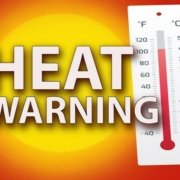Heat Warning Issued – Fraser Health – May 11 -16, 2023
Heat Warning Issued
We have received notice that a Environment and Climate Change Canada has issued a Yellow Weather Notification Heat Warning for the Fraser Valley. Daytime high temperatures of 20s to low 30s degrees celsius. . Daytime high temperatures of 20s to low 30s degrees celsius. Nighttime temperatures: low to mid 10s. Although daytime temperatures may approach Heat Warning criteria for some regions during this time frame, nighttime temperatures are forecast to cool significantly and unlikely to reach warning criteria.
With elevated temperatures, the risk of heat related illness increases, particularly in seniors and those more vulnerable.
What can friends and family members do to help mitigate the heat and minimize its impact on our seniors?
- FANS – Ensure your loved one in Menno Home or Menno Hospital has a fan that can bring cool air into their room from the common areas that are cooler
- WINDOW COVERINGS – Menno Home and Hospital have new window coverings and film to reduce heat. Keep the curtains / blinds closed
- AIR CONDITIONER – The apartments can have individual air-conditioners ]installed – Click for air-conditioner specifications
- HYDRATION – Ensure your loved one has fluids available for their hydration needs. Menno Place provides water in the apartment foyers and for all residents in Menno Home and Menno Hospital
- COMMUNICATION – Call your loved one to see how they are doing. Call Menno Place if you want to know how your loved one is doing in the heat.
In anticipation of this extended period of hot and dry weather, Menno Place has:
- reviewed our heat plan and implemented it as required
- prioritized A/C installation for each of the apartment suites that need individual A/C setup each year
- The maintenance team installed 143 air conditioners in the apartments this week!
- Continued installation of A/C in Menno Home and Hospital.
- Menno Hospital dining room A/C will be installed in the next few weeks
Since 2022, Menno Place has done the following to mitigate heat:
- $180,000 for HVAC upgrades in Menno Hospital
- $178,000 for Menno Home “swing air-conditioner units”
- $170,000 for Menno Home “mini-split air-conditioning”
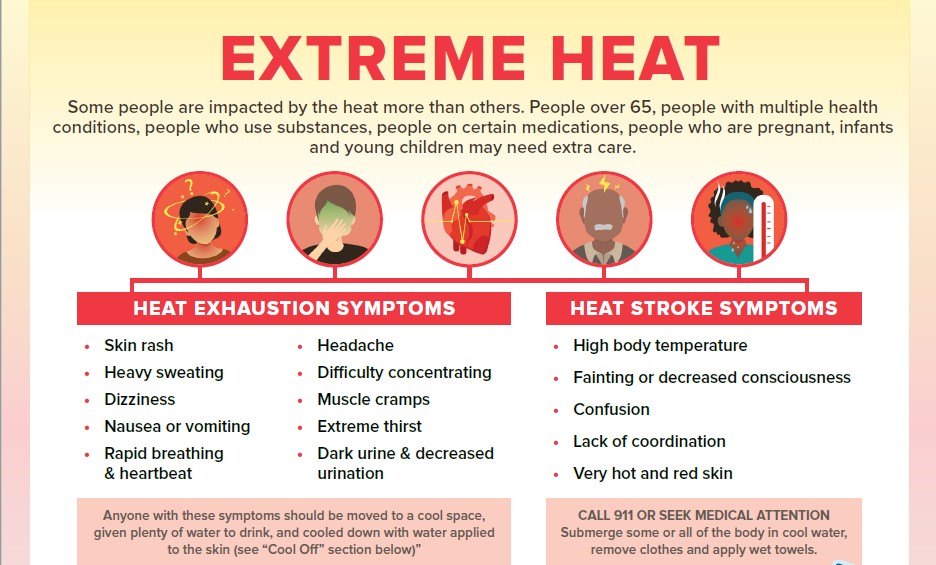
What’s happening to keep Menno Place cool? CLICK HERE TO LEARN MORE
To protect our residents and tenants, we pro-actively monitor for heat-related conditions, following our Heat Preparedness Plan.
We mitigate risk by:
- ensuring hydration to all those who receive care services
- providing water / hydration stations in all buildings for staff and tenants
- providing cooling cloths to all who receive care services
- closing blinds/curtains and ask tenants to do the same
- ensure those in care are wearing light-weight clothing and reminding tenants to do the same
- encouraging apartment tenants to seek out air-conditioned spaces or get an air-conditioner installed
To prevent heat exhaustion among our staff, staff mask and goggle wearing requirements may temporarily be relaxed in extreme heat. We follow our Heat Safety Plan.
As a reminder, fans may not effectively reduce body temperatures or prevent heat-related illness in people at risk. Fans should be used to move cool air around and not be used as a primary cooling device. In Menno Home and Hospital, staff will expose residents to air conditioned spaces whenever possible. Visitors and family members for those in the Apartments should do the same. Residents should move into common spaces which are air-conditioned in the Apartments in order to keep cool.
Does your loved one live in Independent Living Apartments (Pavilion, Terrace West, Primrose Gardens):
Call them daily during the Extreme / Heat Warning to ensure that they know how to keep cool and are following the recommended safety measures (below).
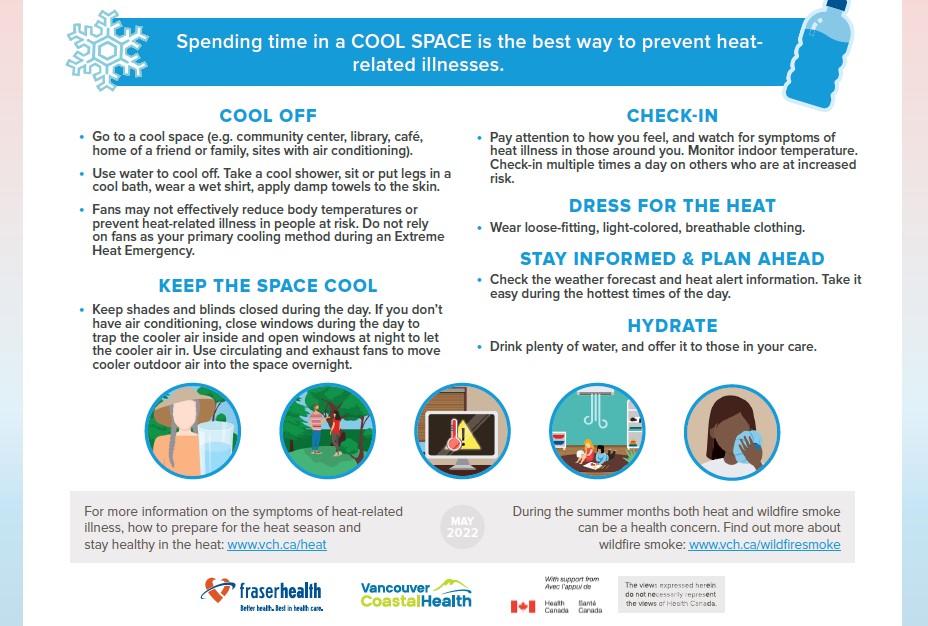
Quick Tips for Extreme Heat
How to keep your body cool and comfortable:
- Drink plenty of water
- Put on sunscreen when outside
- Wear loose fitting, light coloured, breathable clothing
- Avoid being in direct sunlight for too long
- Place a cold, wet towel around your neck
- Keep your apartment cool by closing the blinds, using AC, and limiting oven use
- Shower, bathe, or sponge off with cool water
How do I get air-conditioning in the apartments? What A/C unit should I purchase? CLICK HERE FOR ALL DETAILS
And if you experience symptoms of a heat stroke (high body temperature, dizziness or fainting, confusion, and very hot and red skin), call 9-1-1.
How to keep your apartment suite cool and comfortable:
- Turn off the heat in your room on the thermostat
- Turn on air-conditioning. Keep it on throughout the heat warning.
- If you have air-conditioning, keep your doors and windows closed to keep the cold air in
- Close your blinds or curtains in bedroom and living room to keep out the sun/heat
- Do not go outside, or choose to take your walks early morning
- Do not sit in a parked car or leave a pet in a parked car
- Avoid using the stove to cook a meal
- Take a break if your suite is hot, and spend some time on the 1st floor of your building in the air-conditioned common areas. Bring a book, or some knitting and relax.
- If it cools down (below 26C) at night, open your windows and doors to let in the cool air
- Make arrangements to stay at someone’s air-conditioned place, or hotel to cool down
- Sprinkle clothing with water
- Splash cool water on your face and back of neck
If you can’t get cool enough, call your family or support friends and check in. Let them know you could use some help. Try to plan a visit with your family who has air-conditioning.
Heat Exhaustion Symptoms
- Skin rash
- Heavy Sweating
- Headache
- Dizziness
- Fainting
- Nausea
- Vomiting
- Rapid Heartbeat and breathing
- Muscle cramps
- Extreme thirst and/or dark urine or decreased urination
Anyone with one or more of these symptoms should move to a cool space immediately and let someone know they are not feeling well.
Heat Stroke Symptoms
- High body temperature
- Dizziness
- Fainting
- Confusion
- Lack of coordination
- Very hot and red skin
Anyone with any of these symptoms should call 911 immediately
————————-
BC Provincial Heat Alert and Response System – HARS criteria
A heat warning is issued for a region when there are two or more consecutive days during which the daytime maximum temperatures are forecast to reach or exceed the trigger temperature criteria for that region, and the nighttime minimum temperatures are forecast to fall only to the region-specific temperature or warmer. These temperature thresholds indicate moderate public health risk. This criteria is the minimum basis for the extreme heat emergency.
- While the heat warning criteria vary by region, an alert will be issued for the entire Lower Mainland if Vancouver or Abbotsford weather stations are expected to reach the warning criteria.
An extreme heat emergency emphasizes the very high public health risk that exists when high temperatures increase day over day, based on temperatures and conditions that indicate a very high public health risk, including a larger increase in deaths in the community is expected. Criteria are met when the forecast or observed temperatures in each region surpasses the heat warning criteria, and there is high certainty that temperatures would substantively increase day over day for three or more consecutive days.
| Level | Southwest | Southwest inland | Alert |
| Heat warning | 2 or more consecutive days of daytime maximum temperatures are expected to reach 29°C or warmer and nighttime minimum temperatures are expected to be at 16°C or warmer | 2 or more consecutive days of daytime maximum temperatures are expected to reach 33°C or warmer and nighttime minimum temperatures are expected to be at 17°C or warmer | Once the criteria is met, Environment and Climate Change Canada issue alerts for the specific regions. |
| Extreme heat emergency | Heat warning criteria have been met AND forecast indicates that daily highs will substantively increase day over day for three or more consecutive days | Once the criteria is met, and based on a decision from the BC HEAT Committee, Environment and Climate Change Canada issue alerts for the specific regions. | |
HARS has three alert levels. The levels are based on 3 factors that characterize an extreme heat event: intensity, duration and night-time exposure.
The Regional Public Health Offices monitor meteorological alerting provided by Environment and Climate Change Canada to determine when it is necessary to issue a Heat Alert. The Regional Public Health Offices advise the public that conditions exist that could result in negative health effects.
The heat alert will be issued on the Government of NB account @Gov_NB.
Level 1
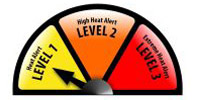
When a Heat Alert (Level 1) is issued, certain vulnerable persons may be affected. The main cause of illness and death during a heat wave is the aggravation of pre-existing respiratory and cardiovascular diseases.
Level 2
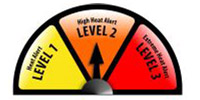
When a High Heat Alert (Level 2) is called, everyone is at increased risk of heat stress and heat stroke under the conditions.
- People living alone without air conditioning are at high risk especially if the heat wave lasts many days.
- Check regularly on your neighbours and relatives to make sure they are not in danger
- Organizers of sport and recreational activities should build in regular water breaks and rest or consider rescheduling activities.
Level 3
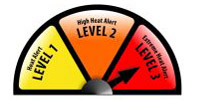
During an Extreme Heat Alert (Level 3) everyone is at high risk for heat related illnesses and heat stroke.
- People living alone without air conditioning are at extreme risk.
- Check regularly on your neighbours and relatives to make sure they are not in danger.
- Organizers of sport and recreational activities should reschedule activities.

